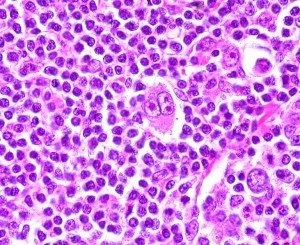August 29th, 2011 by Elaine Schattner, M.D. in News
No Comments »

 Recently, the FDA announced its approval, upon accelerated review, of a new drug, Adcetris (brentuximab) for patients with Hodgkin’s lymphoma that has relapsed after bone marrow transplant and for some patients with T-cell anaplastic large cell lymphoma (ALCL).
Recently, the FDA announced its approval, upon accelerated review, of a new drug, Adcetris (brentuximab) for patients with Hodgkin’s lymphoma that has relapsed after bone marrow transplant and for some patients with T-cell anaplastic large cell lymphoma (ALCL).
This interests me for a lot of reasons, among them that I used to work in the field of lymphoma immunology and spent some time in my life studying molecules like CD30, the protein to which the new antibody binds.
First, a mini-primer on the disease and numbers of patients involved: Read more »
*This blog post was originally published at Medical Lessons*
January 28th, 2011 by Elaine Schattner, M.D. in News, Opinion
1 Comment »

The FDA [has] issued an alert about a possible link between breast implants — saline or silicone — and a rare form of lymphoma called anaplastic large cell lymphoma (ALCL). These lymphoma cases are exceedingly rare, but the association appears to be significant.
The FDA identified a total of approximately 60 ALCL cases in association with implants, worldwide. Of these, 34 were identified by review of published medical literature from 1997 to May, 2010; the others were reported by implant manufacturers and other sources. The agency estimates the number of women worldwide with breast implants is between five and 10 million. These numbers translate to between six and 12 ALCL cases in the breast, per million women with breast implants, assessed over 13 years or so.
In women who don’t have implants, ALCL is an infrequent tumor, affecting approximately one in 500,000 women is the U.S. per year. This form of lymphoma — a malignancy of lymphocytes, a kind of white blood cell — can arise almost anywhere in the body. But ALCL cases arising in the breast are unusual. The FDA reports that roughly three in 100,000,000 women are diagnosed with ALCL in the breast per year in the U.S.
These are very small numbers. Still, the finding of ALCL tumors by the implant capsules is highly suggestive. Almost all of the implant-associated ALCL cases were T-cell type, whereas most breast lymphomas are of B-cell type. The lymphomas arose in women with both silicone and saline-type implants, and in women with implants placed for purposes or augmentation and for reconstruction after mastectomy. Read more »
*This blog post was originally published at Medical Lessons*
January 27th, 2011 by John Di Saia, M.D. in News, Opinion
1 Comment »

 From the Food and Drug Administration (FDA) safety alert yesterday:
From the Food and Drug Administration (FDA) safety alert yesterday:
ISSUE: The FDA announced a possible association between saline and silicone gel-filled breast implants and anaplastic large cell lymphoma (ALCL), a very rare type of cancer. Data reviewed by the FDA suggest that patients with breast implants may have a very small but significant risk of ALCL in the scar capsule adjacent to the implant.
BACKGROUND: In total, the agency is aware of about 60 cases of ALCL in women with breast implants worldwide. This number is difficult to verify because not all cases were published in the scientific literature and some may be duplicate reports. An estimated 5 million to 10 million women worldwide have breast implants. According to the National Cancer Institute, ALCL appears in different parts of the body including the lymph nodes and skin. Each year ALCL is diagnosed in about 1 out of 500,000 women in the United States. ALCL located in breast tissue is found in only about 3 out of every 100 million women nationwide without breast implants.
While the FDA’s new report is interesting, as it stands it’s of little consequence. A mere 60 cases of a unusual breast cancer worldwide is a tiny number compared to the huge number who develop the much more common ductal breast cancers (about one in seven women in the U.S.) Breast implants have not been found to affect this more common cancer incidence. I do expect this statistic to be misquoted by the anti-breast implant factions online.
As an aside, I do remember a case in a fellow plastic surgeon’s mother of a lymphoma near a breast implant capsule when I was a resident. This is the only breast cancer of this type I have ever seen, however, in 14 years of practice. While I don’t doubt the association, I do focus on the significance of this report to the average breast implant patient, which is very little at this point.
– John Di Saia, M.D.
*This blog post was originally published at Truth in Cosmetic Surgery*
 Recently, the FDA announced its approval, upon accelerated review, of a new drug, Adcetris (brentuximab) for patients with Hodgkin’s lymphoma that has relapsed after bone marrow transplant and for some patients with T-cell anaplastic large cell lymphoma (ALCL).
Recently, the FDA announced its approval, upon accelerated review, of a new drug, Adcetris (brentuximab) for patients with Hodgkin’s lymphoma that has relapsed after bone marrow transplant and for some patients with T-cell anaplastic large cell lymphoma (ALCL).












